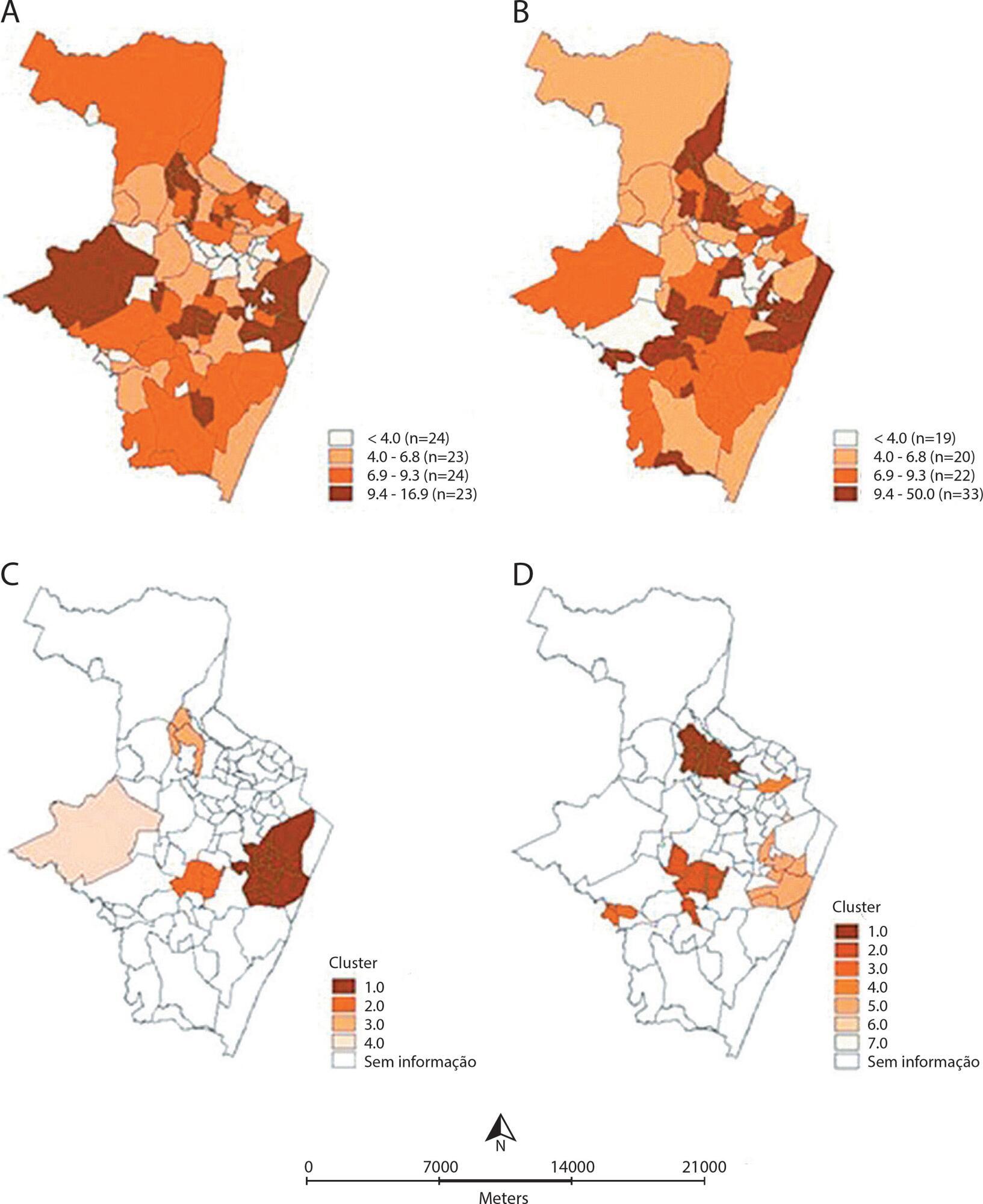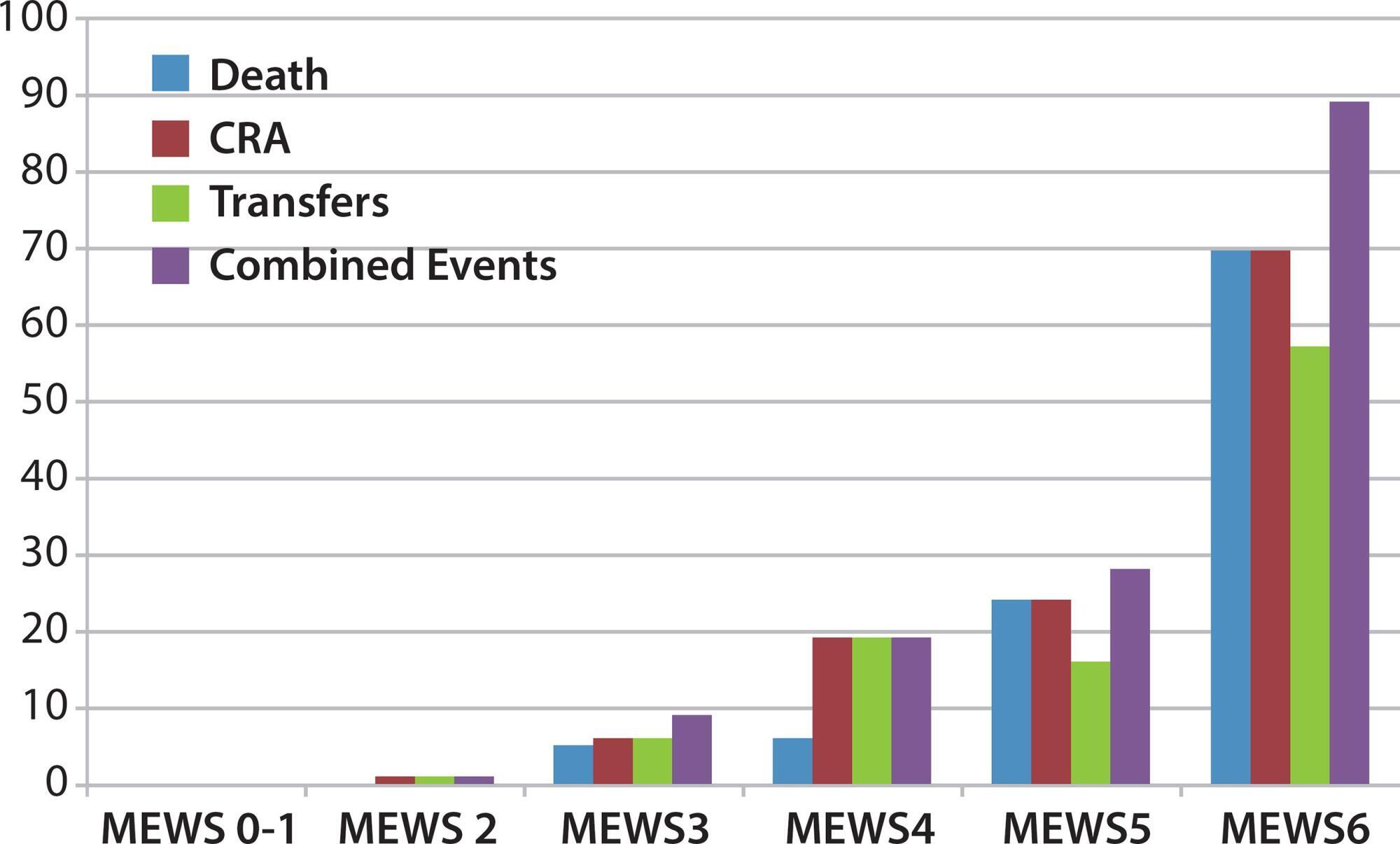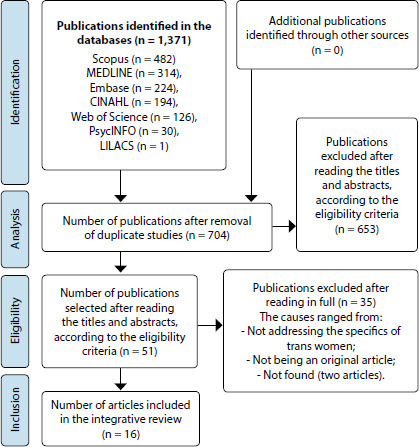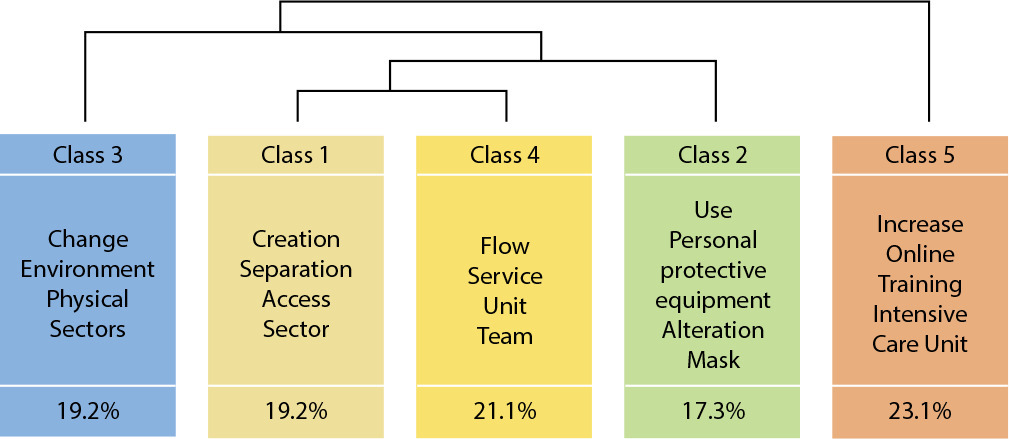-
ORIGINAL ARTICLE03-15-2024
Effects of training Community Health Agents on dementia: a quasi-experimental study
Revista Brasileira de Enfermagem. 2024;77(1):e20230027
Abstract
ORIGINAL ARTICLEEffects of training Community Health Agents on dementia: a quasi-experimental study
Revista Brasileira de Enfermagem. 2024;77(1):e20230027
DOI 10.1590/0034-7167-2023-0027
Views1See moreABSTRACT
Objectives:
to evaluate the knowledge of Community Health Agents about dementia before and after the training workshop for detecting signs of the disease.
Methods:
a quasi-experimental study with 33 community agents, in which sociodemographic information and knowledge about dementia were collected and assessed using the Alzheimer’s Disease Knowledge Scale before and after the workshop. There were 10 weekly, online, synchronous meetings. The Student’s t-test for related samples was used, and the effect size was calculated.
Results:
while the average score on the initial assessment, using the measurement instrument, was 16.3, it was 21.24 in the final assessment. An increase in the scale score was observed after participating in the workshop, with a value of 4.94.
Conclusions:
it is urgent to invest in the ongoing education of these professionals for greater awareness in the timely detection of dementia cases in primary care and awareness of potentially modifiable factors.
-
REVIEW03-15-2024
Resources for health literacy among caregivers of prematurely born children: a scoping review
Revista Brasileira de Enfermagem. 2024;77(1):e20230062
Abstract
REVIEWResources for health literacy among caregivers of prematurely born children: a scoping review
Revista Brasileira de Enfermagem. 2024;77(1):e20230062
DOI 10.1590/0034-7167-2023-0062
Views1See moreABSTRACT
Objectives:
to map the available evidence on resources used to promote health literacy among caregivers of prematurely born children during outpatient follow-up.
Methods:
the Joanna Briggs Institute’s scope review protocol was utilized. The search encompassed six databases, incorporating studies from 2012 to 2022.
Results:
the three included publications revealed that the resources employed are: mobile applications, phone calls, individual counseling, videos, educational pamphlets, and group discussions. Implementing an education protocol during the transition home enhances scientifically grounded health promotion rates.
Conclusions:
there is limited literature addressing the health literacy of these caregivers. The nursing team plays a crucial role in health education and in developing resources applicable to these families.

-
ORIGINAL ARTICLE03-15-2024
Health Management of an HIV Testing and Counseling Center: Nursing Contributions
Revista Brasileira de Enfermagem. 2024;77(1):e20230217
Abstract
ORIGINAL ARTICLEHealth Management of an HIV Testing and Counseling Center: Nursing Contributions
Revista Brasileira de Enfermagem. 2024;77(1):e20230217
DOI 10.1590/0034-7167-2023-0217
Views0See moreABSTRACT
Objectives:
to analyze the role of nursing in the establishment of an HIV/AIDS Testing and Counseling Center in a Brazilian municipality.
Methods:
a historical study utilizing primary sources, including documents and oral accounts, involving a total of ten participants. The study encompasses the years 1997 and 1998. The research took place at the Testing and Counseling Center in São João de Meriti. Data was collected from March to May 2022.
Results:
nursing made significant contributions through the development of training initiatives led by nurses, who were also responsible for individual and group counseling, as well as HIV testing requests.
Final Considerations:
nursing played a crucial role in the center and in the management of Sexually Transmitted Infections, being involved in all stages of treatment in accordance with current public health policy.
-
ORIGINAL ARTICLE03-15-2024
Is there scientific relevance to the plot of films and documentaries about eating disorders?
Revista Brasileira de Enfermagem. 2024;77(1):e20220547
Abstract
ORIGINAL ARTICLEIs there scientific relevance to the plot of films and documentaries about eating disorders?
Revista Brasileira de Enfermagem. 2024;77(1):e20220547
DOI 10.1590/0034-7167-2022-0547
Views1See moreABSTRACT
Objectives:
to analyze films and documentaries about eating disorders from the last twenty years, identifying the way they approach the topic as well as their relevance for didactic use in teaching the health field.
Methods:
a descriptive study, whose data collection was carried out on the main streaming and video platforms, resulting in the survey of 60 media. Of these, only 25 had audio/subtitles in Portuguese (inclusion criteria). scientific relevance was analyzed considering psychopathological and epidemiological aspects of these disorders. A questionnaire about the plot, characters and descriptive data analysis were used.
Results:
most media were dramas about female teenagers who tried to conform to beauty stereotypes, whose symptoms portrayed converged with current medical diagnostic manuals.
Conclusions:
in practical terms, a classificatory list of 11 media was prepared that could be used as a teaching resource for teaching this topic in the health field.

-
REVIEW03-15-2024
Nursing care for parents who have experienced fetal demise: integrative review
Revista Brasileira de Enfermagem. 2024;77(1):e20220811
Abstract
REVIEWNursing care for parents who have experienced fetal demise: integrative review
Revista Brasileira de Enfermagem. 2024;77(1):e20220811
DOI 10.1590/0034-7167-2022-0811
Views0See moreABSTRACT
Objectives:
to identify scientific evidence regarding nursing care for parents who have experienced grief following fetal demise.
Methods:
an integrative review of original studies was conducted across six databases. The studies were classified according to the level of evidence.
Results:
the qualitative analysis of the nine studies comprising the sample involved thematic categories, exploring the impact of perinatal loss on families, inadequate communication by healthcare professionals, and the importance of a holistic approach in care. The role of the nurse is highlighted in making a positive contribution to the team, emphasizing participation in training and the provision of essential information.
Final Considerations:
grieving affects not only family dynamics but also the social environment, emphasizing the urgency of a more empathetic and comprehensive approach. Care should be holistic, going beyond technical nursing assistance, and addressing the biopsychosocial context of the parents.

-
ORIGINAL ARTICLE03-15-2024
Cultural adaptation and validity evidence of the Student Nurse Stressor-15 (SNS-15) Scale for Brazil
Revista Brasileira de Enfermagem. 2024;77(1):e20230356
Abstract
ORIGINAL ARTICLECultural adaptation and validity evidence of the Student Nurse Stressor-15 (SNS-15) Scale for Brazil
Revista Brasileira de Enfermagem. 2024;77(1):e20230356
DOI 10.1590/0034-7167-2023-0356
Views0See moreABSTRACT
Objectives:
to carry out the cultural adaptation and evaluation of validity evidence of the Student Nurse Stressor-15 (SNS-15) Scale for use in Brazil.
Methods:
psychometric study, conducted from the stages of translation, synthesis, back-translation, review by a committee of seven experts, pre-test and evaluation of measurement properties with 32 and 238 nursing students, respectively. Descriptive statistics, Exploratory Factor Analysis (EFA), and Confirmatory Factor Analysis (CFA) were performed. The reliability of the instrument was estimated using McDonald’s Omega (ω).
Results:
EFA subsidized the distribution of the fifteen SNS-15 items into four factors. Using AFC, satisfactory fit indices were achieved (Comparative Fit Index = 0.94; Tucker-Lewis Index = 0.93; Root Mean Square Error of Approximation = 0.06; Standardized Root Mean Square Residual = 0.16) and ω = 0.86.
Conclusions:
the Brazilian version of the SNS-15 presents evidence that confirms its validity and reliability.
-
REVIEW03-15-2024
Use of podcasts for health education: a scoping review
Revista Brasileira de Enfermagem. 2024;77(1):e20230096
Abstract
REVIEWUse of podcasts for health education: a scoping review
Revista Brasileira de Enfermagem. 2024;77(1):e20230096
DOI 10.1590/0034-7167-2023-0096
Views0See moreABSTRACT
Objectives:
to map the scientific evidence related to the characteristics, themes, and outcomes of using health education podcasts aimed at individuals over 18 years of age in intra or extrahospital environments.
Methods:
a scoping review, based on the Joanna Briggs Institute method, conducted in 11 databases, including studies from 2004 to 2022.
Results:
11 studies were selected, categorized, highlighting the characteristics, evaluated outcomes, areas, and conditions of podcast application, indicating it as an effective tool for promoting behavioral change, health promotion, and social interaction, demonstrating its potential to improve well-being, quality of life, and user/client autonomy.
Conclusions:
the use of podcasts proves to be an effective, innovative, and low-cost tool, with a significant social impact, being effective for behavioral change, satisfaction, and social interaction. However, the lack of comprehensive studies on podcast development methodologies represents challenges to be overcome.

-
ORIGINAL ARTICLE03-11-2024
Use of an application on the measles vaccine for Warao indigenous refugees in Brazil
Revista Brasileira de Enfermagem. 2024;77:e20230253
Abstract
ORIGINAL ARTICLEUse of an application on the measles vaccine for Warao indigenous refugees in Brazil
Revista Brasileira de Enfermagem. 2024;77:e20230253
DOI 10.1590/0034-7167-2023-0253
Views1See moreABSTRACT
Objective:
To evaluate the need to develop an application with information about the measles vaccine for Warao indigenous people.
Methods:
This was a quantitative study conducted at the Espaço de Acolhimento Tapanã refugee shelter in the city of Belém, Pará, Brazil. The study sample was selected for convenience. Data were analyzed descriptively using Bioestat 5.0 software.
Results:
Twenty-one Warao indigenous individuals were interviewed. It was identified that 91% (n=20) had lost their vaccination card; 91% (n=20) stated they had lost their vaccination card more than three times, and 91% expressed interest in an application to store their vaccination information.
Conclusions:
The research provided important information for the development of a health application named WaraoMedI (Warao Measles Diversity Indigenous), as well as offered nursing professionals evidence about the challenges Warao indigenous refugees face in self-managing their vaccination information.

-
ORIGINAL ARTICLE07-15-2020
Spatial analysis of inequalities in fetal and infant mortality due to avoidable causes
Revista Brasileira de Enfermagem. 2020;73:e20190088
Abstract
ORIGINAL ARTICLESpatial analysis of inequalities in fetal and infant mortality due to avoidable causes
Revista Brasileira de Enfermagem. 2020;73:e20190088
DOI 10.1590/0034-7167-2019-0088
Views0See moreABSTRACT
Objectives:
to analyze social inequalities in spatial distribution of fetal and infant mortality by avoidable causes and identify the areas of greater risk of occurrence.
Methods:
avoidable deaths of fetal and infant residents of Recife/Brazil were studied. The rates of avoidable fetal and infant mortality were calculated for two five-year periods, 2006-2010 and 2011-2015. The scan statistics was used for spatial analysis and related to the social deprivation index.
Results:
out of the total 2,210 fetal deaths, 80% were preventable. Avoidable fetal mortality rates increased by 8.1% in the five-year periods. Of the 2,846 infant deaths, 74% were avoidable, and the infant mortality rate reduced by 0.13%.
Conclusions:
in the spatial analysis, were identified clusters with higher risk for deaths. The social deprivation index showed sensibility with areas of worse living conditions.

-
ORIGINAL ARTICLE10-21-2019
Evaluation of the performance of the modified early warning score in a Brazilian public hospital
Revista Brasileira de Enfermagem. 2019;72(6):1428-1434
Abstract
ORIGINAL ARTICLEEvaluation of the performance of the modified early warning score in a Brazilian public hospital
Revista Brasileira de Enfermagem. 2019;72(6):1428-1434
DOI 10.1590/0034-7167-2017-0537
Views0See moreABSTRACT
Objective:
To evaluate the performance of the modified early warning score (Mews) in a nursing ward for patients in clinical deterioration.
Method:
This is an analytical, quantitative and predictive study. Mews’ parameters (systolic blood pressure, heart rate, respiratory rate, temperature and level of consciousness) were evaluated every six hours. The following events were reported: death, cardiopulmonary arrest and transfer to intensive care. The evaluations were performed in a hospital of reference in the state of São Paulo, Brazil.
Results:
A total of 300 patients were included (57 ± 18 years old, males: 65%). There number of combined events was observed to be greater the higher the score’s value (00%; 00%; 01; 09%; 19%; 28%; 89%, respectively, for Mews 0; 1; 2; 3; 4; 5 and 6; p < 0.0001). Mews ≥ 4 was the most appropriate cut-off point for prediction of these events (sensitivity: 87%, specificity: 85% and accuracy: 0.86).
Conclusion:
Mews properly measured the occurrence of severe events in hospitalized patients of a Brazilian public hospital’s nursing ward. Mews ≥ 4 seems to be the most appropriate cut-off point for prediction of these events.

-
ORIGINAL ARTICLE10-18-2022
Nursing professionals’ biosafety in confronting COVID-19
Revista Brasileira de Enfermagem. 2022;75:e20201104
Abstract
ORIGINAL ARTICLENursing professionals’ biosafety in confronting COVID-19
Revista Brasileira de Enfermagem. 2022;75:e20201104
DOI 10.1590/0034-7167-2020-1104
Views0See moreABSTRACT
Objective:
To investigate the nursing professionals’ biosecurity in confronting COVID-19.
Methods:
This is a Survey type study. Nursing professionals were invited via messaging apps, using self-applied data collection forms. The sample selection (n=693) was non-probabilistic. A descriptive data analysis was conducted.
Results:
considering the biosafety aspects in facing COVID-19, 79.0% of the participants had not received training or considered it insufficient, 69.3% reported the lack of personal protective equipment during work, and 81.8% did not feel safe with the internal flux adaptations for handling COVID-19 cases.
Conclusion:
Continuous and effective nursing team training and personal protective equipment availability are necessary, as well as internal flow adjustments for attending suspected or confirmed cases.
-
ORIGINAL ARTICLE07-08-2020
The association between knowledge about HIV and risk factors in young Amazon people
Revista Brasileira de Enfermagem. 2020;73(5):e20190453
Abstract
ORIGINAL ARTICLEThe association between knowledge about HIV and risk factors in young Amazon people
Revista Brasileira de Enfermagem. 2020;73(5):e20190453
DOI 10.1590/0034-7167-2019-0453
Views0See moreABSTRACT
Objectives:
analyze the association between the level of HIV knowledge among young people from Amazonas region, their sociodemographic profile and infection risk factors.
Methods:
cross-sectional analytical study, which used a structured questionnaire containing questions about sociodemographic, behavioral aspects and HIV knowledge. Data were grouped by sex and underwent ordinal and binary logistic regression analysis.
Results:
the students had an HIV knowledge deficit, associated with a low educational level of their parents and low family income. The most frequent risk factors were lack of knowledge on the part of female students regarding proper male condom use, their infrequent use in sexual relations and failure to do HIV testing. There was an association between level of knowledge and use of dating apps by female students.
Conclusions:
there was no association between level of knowledge and the preponderant risk factors, but the students’ knowledge deficit rendered them more vulnerable to infection.
-
REVIEW03-07-2022
Gender violence perpetrated against trans women
Revista Brasileira de Enfermagem. 2022;75:e20210173
Abstract
REVIEWGender violence perpetrated against trans women
Revista Brasileira de Enfermagem. 2022;75:e20210173
DOI 10.1590/0034-7167-2021-0173
Views0See moreABSTRACT
Objectives:
to identify scientific evidence on gender violence perpetrated against trans women.
Methods:
integrative review, carried out in June 2020, without time frame, in the Scopus, MEDLINE, Embase, CINAHL, WoS, PsycInfo and LILACS databases. The controlled descriptors of DeCS, MeSH and their entry terms were used: “Transgender People”, “Transgender”, “Gender Identity”, “Transsexuality”, “Gender Violence”, “Aggression”, “Sexual Offenses”, “Rape”, “Violence”, “Domestic Violence”. The presentation and synthesis of the results were presented in the PRISMA-2009 flowchart.
Results:
the final sample, consisting of 16 articles, identified different types of violence (sexual, physical, verbal, psychological and financial), perpetrated by family members, strangers, police officers, intimate partners, health professionals, acquaintances, or friends.
Conclusions:
trans women suffer violence and social exclusion that result from stigma and discrimination due to gender identity and result in unrestricted damage to physical health.

-
ORIGINAL ARTICLE11-29-2022
Changes implemented in the work environment of nurses in the COVID-19 pandemic
Revista Brasileira de Enfermagem. 2022;75:e20201381
Abstract
ORIGINAL ARTICLEChanges implemented in the work environment of nurses in the COVID-19 pandemic
Revista Brasileira de Enfermagem. 2022;75:e20201381
DOI 10.1590/0034-7167-2020-1381
Views0See moreABSTRACT
Objective:
to describe the changes implemented in the work environment of nurses in university hospitals considering the COVID-19 pandemic.
Methods:
this qualitative and descriptive research was developed from an online survey with 75 nurses from three Brazilian university hospitals. Data processing occurred through textual analysis with the aid of software IRAMUTEQ.
Results:
five semantic classes were obtained: Organization of units for exclusive care of patients with COVID-19; Adaptations in the use of personal protective equipment; Physical structure adaptation; Care flow institution; Increased number of beds and training courses. Final considerations: the results show the effort of healthcare and nursing professionals/managers in the development of structural adaptations and reorganizations of care processes, in the hospital context, to respond with quality and efficiency to the demands arising from the COVID-19 pandemic.

-
ORIGINAL ARTICLE03-07-2022
Women’s perception of labor and birth care: obstacles to humanization
Revista Brasileira de Enfermagem. 2022;75:e20210215
Abstract
ORIGINAL ARTICLEWomen’s perception of labor and birth care: obstacles to humanization
Revista Brasileira de Enfermagem. 2022;75:e20210215
DOI 10.1590/0034-7167-2021-0215
Views0See moreABSTRACT
Objectives:
to understand women’s perception regarding the care received during labor and birth.
Methods:
this is a descriptive-exploratory, qualitative study carried out with 54 postpartum women from hospitals in the Metropolitan Region II of the state of Rio de Janeiro, from January to December 2018, using semi-structured interviews submitted to content analysis.
Results:
puerperal women’s perceptions about the childbirth care they received indicated the use of interventions, such as pressure maneuvers on the uterine fundus during the expulsion period – Kristeller maneuver, episiotomy and repeated vaginal examination and without consent. The use of institutional routines, such as zero diet, horizontal birth and disrespect.
Final Considerations:
despite the encouragement of public humanization policies, the technocratic model is still present in obstetric care during childbirth. The humanization of obstetric care requires changes in attitudes and care paradigms, in order to guarantee respect and the right to quality care.
-
ORIGINAL ARTICLE10-21-2019
Permanent education for good practices in the prevention of pressure injury: almost-experiment
Revista Brasileira de Enfermagem. 2019;72(6):1646-1652
Abstract
ORIGINAL ARTICLEPermanent education for good practices in the prevention of pressure injury: almost-experiment
Revista Brasileira de Enfermagem. 2019;72(6):1646-1652
DOI 10.1590/0034-7167-2018-0778
Views0See moreABSTRACT
Objective:
To verify the effectiveness of the educational intervention through the evaluation of nurses’ knowledge about prevention of pressure injury.
Method:
A quasi-experimental study with a single group, carried out with 95 nurses from a teaching hospital in the interior of Minas Gerais, in August and September 2017. As a teaching strategy, the active methodology and hybrid teaching were used, based on the reference of the Method of the Arch of Charles Maguerez. Data were collected from a validated instrument, called the Pieper Knowledge Test, and analyzed by descriptive statistics and Student’s t-test with significance level of p <0.001.
Results:
The mean number of correct answers obtained by the nurses was 78.8% in the pre-test and 88.8% in the post-test, and the difference was statistically significant (p <0.001).
Conclusion:
The educational intervention developed was effective, since it contributed to the improvement of nurses’ knowledge.

Search
Search in:
Nuvem de Tags
Adolescente (85) Atenção Primária à Saúde (239) COVID-19 (91) Criança (91) Cuidados de Enfermagem (269) Educação em Enfermagem (151) Educação em Saúde (139) Enfermagem (930) Enfermagem Pediátrica (86) Estudantes de Enfermagem (77) Estudos de Validação (131) Família (87) Idoso (208) Promoção da Saúde (99) Qualidade de Vida (104) Saúde do Trabalhador (86) Saúde Mental (145) Saúde Pública (82) Segurança do Paciente (150) Tecnologia Educacional (100)



